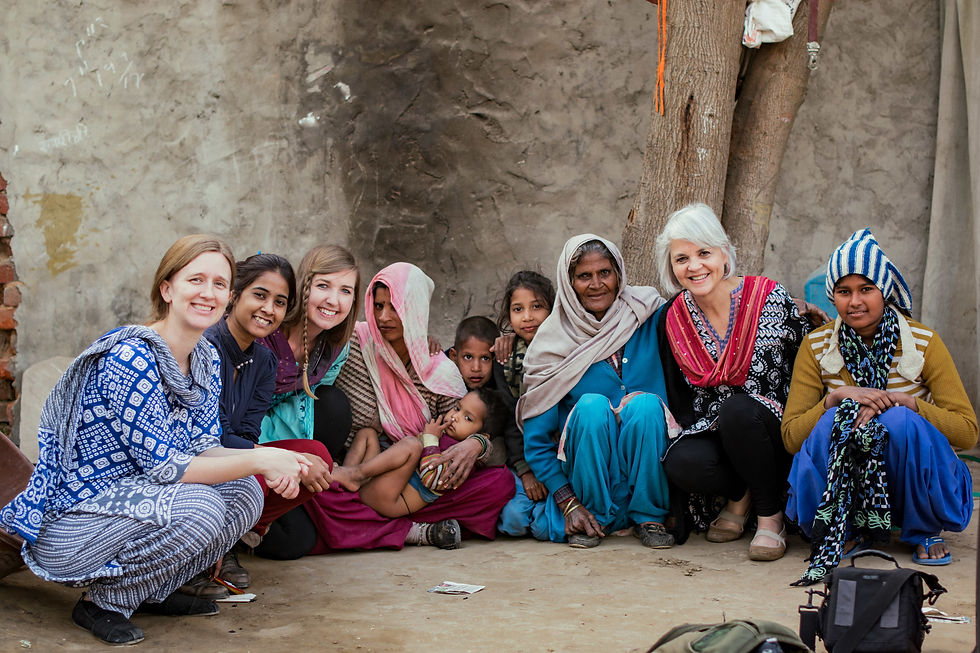There’s a moment, just before Jesus is arrested, when a woman anoints him with expensive perfume in preparation for his death. When criticized by Judas for “wasting” costly resources, Jesus defends her, asserting that, “Wherever this gospel is preached throughout the world, what she has done will also be told, in memory of her,” (Mt. 26:6-13) And so it is that thousands of years later this account is preserved and told. We bear witness to her compassion, kindness, and discernment in the final hours of Jesus’ life. It’s through this story, and so many others, we see Jesus’ conviction to preserve narratives for coming generations — specifically narratives that would otherwise go untold.

Rosemary Sherrod, ethnographer, along with translator Cathy John, interview Ram Rakhi about her life experiences as a midwife.
Although history has mostly been written by the pens of wealthy and powerful men, there remains an underlying current of the powerless men and women whose stories have been carefully preserved. Most often, characters like these are noted for their bravery and selflessness amidst great hardship and trial. It is with these history makers in mind that we approached the story of Ram Rakhi, a village midwife on the outskirts of Delhi, India.
When we met Ram Rakhi a little less than two years ago, it didn’t take long to discover that she was born a storyteller and her story was undeniably worth telling. Married at 11, she had her first baby only a few years later. Catapulted by her own tumultuous experience, she began learning the practice of midwifery from her grandmother. Rakhi quickly became a trusted source of maternal care for women in her village. In the 50 years since, she has been faithfully practicing and delivering the majority of children in her village. However, the scene of maternal health care in India has drastically changed.

Rakhi, alongside her daughter-in-law and three of her grandchildren, all of whom she delivered.
Ten or 20 years ago, the vast majority of women in India were giving birth with a midwife at home. However, in an effort to improve India’s dire maternal mortality ratio, the government looked past trusted and experienced midwives like Rakhi, and toward the institutionalization of birth as a remedy. With an influx of government programs to push forward this initiative, the traditional childbirth worker is passing away as a new generation of women in India now view a hospital birth as the better choice.
While Ram Rakhi admits that hospitals are the place where births should happen when things go wrong, her experience stands as a contradiction to the belief that medicalized birth is always better and safer. Rakhi tells of only one birth where the child did not survive in her lifelong practice of midwifery. In this dramatic story, Rakhi told the parents that they could have her two sons if the doctors found that she did something wrong, that could have prevented the death of their child. Upon a hospital’s investigation, the doctor told Rakhi, “this child did not die because of you.”
Despite decades of successful births, compassion and concern for her village sisters, comforting words and methods for relieving pain, and her financial sacrifice <“i charge 50 to 100 rupees (less than $2 usd) for delivering a baby, unless the parents cannot pay at all”>, she is now viewed as a dying breed, the last of her kind.
When the powerful disregard you, when a new generation sees you as obsolete, and when no one comes forward to learn from you, we hope that Rakhi knows that God still sees her and recognizes the need for her story to be told. We believe God intertwined our paths with Ram Rakhi so that we could participate in ensuring her story was told.
<img src="https://images.squarespace-cdn.com/content/v1/514ce42ae4b0d2e6d866511c/1517206346824-DBL1LJP5PCPQDG3HASEZ/DSC_0104.jpg" alt="DSC_0104.jpg" />

<img src="https://images.squarespace-cdn.com/content/v1/514ce42ae4b0d2e6d866511c/1517206334066-J3XW4F0QYKFDFB8EX6WA/DSC_0017.jpg" alt="DSC_0017.jpg" />

<img src="https://images.squarespace-cdn.com/content/v1/514ce42ae4b0d2e6d866511c/1517206422082-KDV6JJOBWYP4OGRQ263H/DSC_0092.jpg" alt="DSC_0092.jpg" />

<img src="https://images.squarespace-cdn.com/content/v1/514ce42ae4b0d2e6d866511c/1517206434009-JCQG46GKOM649J1LXDSC/DSC_0192.jpg" alt="DSC_0192.jpg" />

<img src="https://images.squarespace-cdn.com/content/v1/514ce42ae4b0d2e6d866511c/1517206444182-23C0WCSQ1ZC690WAIETH/DSC_0324.jpg" alt="DSC_0324.jpg" />

<img src="https://images.squarespace-cdn.com/content/v1/514ce42ae4b0d2e6d866511c/1517206360138-7Q4RVRB2S79TB9V83WWZ/DSC_0338.jpg" alt="DSC_0338.jpg" />

<img src="https://images.squarespace-cdn.com/content/v1/514ce42ae4b0d2e6d866511c/1517206443210-81IPFAB4YV48JIXPION7/DSC_0335.jpg" alt="DSC_0335.jpg" />








So we came into her village, where homes have dirt floors and electrical power is minimal, equipped with cameras, microphones, and tripods ready to record her story. Unfamiliar with the premise of making a documentary but clearly unphased by our technology, she spoke passionately, knowing this was her opportunity to share her life as a traditional birth worker with an audience beyond her imagination or reach.
She spoke, we listened. She told her story with her entire body as she demonstrated the methods and ways she helped usher new life into the world. She never hesitated to answer a question. Rakhi was doing more than relating her life’s work, she was preserving it in history, and she knew it. “I tell you all these things,” she stated after three days of interviews, “so others can know what I know.”
In the following months, our team will be working hard to create a quality documentary on this work. We are so excited to share this story with you. If you would like to support our efforts, click here to find out more information & to donate.

Comments